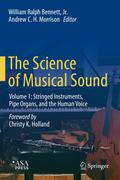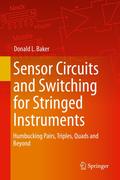65 Results for : stringed
-

The Science of Musical Sound
The Science of Musical Sound - Volume 1: Stringed Instruments Pipe Organs and the Human Voice: ab 53.49 €- Shop: ebook.de
- Price: 53.49 EUR excl. shipping
-

Sensor Circuits and Switching for Stringed Instruments
Sensor Circuits and Switching for Stringed Instruments - Humbucking Pairs Triples Quads and Beyond: ab 53.49 €- Shop: ebook.de
- Price: 53.49 EUR excl. shipping
-
Bach and Friends-Werke für Orgel und Cembalo
This programme contrasts music for harpsichord and organ, genres quite often interchangeable in the Renaissance and Baroque periods. Many manuscripts of the period include pieces suitable for one or other instruments, or both. The absence of an independent pedal does not always imply performance on a stringed keyboard instrument.- Shop: odax
- Price: 18.02 EUR excl. shipping
-
Werke für Violine und Klavier
Like many English composers, Herbert Howells was drawn to the sound of stringed instruments. He recounted the time when Elgar had talked earnestly to him in the cloisters of Gloucester Cathedral about the nature of writing for string orchestra. His advice to the young Howells was to 'study George Frederick Handel, now and all your life'.- Shop: odax
- Price: 10.24 EUR excl. shipping
-
The Birth of the Violin
Smaller stringed instruments began to be developed during the first half of the 16th c., maturing little by little into the vyollon, a term first employed at the court of Savoy in 1523. The works recorded here provide a fine array of contrasting works for the first violins: on one hand, works from the Franco-Flemish school that had been flourishing in Italy since mid-15th c., as well as purely Italian works where motets, ricercars, counterpoints, madrigals and dances are all discovered anew.- Shop: odax
- Price: 17.59 EUR excl. shipping
-
Four-Stringed Voice: Music for Solo Violin
No description.- Shop: odax
- Price: 22.11 EUR excl. shipping
-
KeyNotes-Frühe Europäische Musik für Tasteninstr.
Marti here not only explores the earliest keyboard music to be composed in Europe but also provides a fascinating insight into a world of virtuoso players and the music composed for them, playing a selection of instruments that are hardly known today: a metal-stringed clavisimbalum, an upright gut-stringed claviciterium, two organetti of different sizes, and the church organ in Altenbruch in northern Germany with its array of original pipes that date from the fifteenth century.- Shop: odax
- Price: 18.34 EUR excl. shipping
-
Musik für Bratsche und Klavier
"There is much to be said for the spareness of the contrast achieved by the alto stringed instrument alongside the piano in the more elegiac viola sonata. In this form, the piece is lonelier, the viola nobler. Bashmet's version of the original version (with Sviatislav Richter on Olympia, recorded in 1985, issued in 1997) makes a very powerful case for it." (5* award on RateYourMusic.com)- Shop: odax
- Price: 8.47 EUR excl. shipping
-
Vsnaya Siren Songs of the Electric Cello
'...Or these are the songs that you wander - an ancient woods - to seek and find your way back home. Vivid landscapes, returns and departures, under the subtle gravity of the planets,... if only you will close your eyes.' Josie Phelan is a classically trained musician who has gone on to embrace a wide variety of musical cultures and styles. On this compilation, Josie plays an electric, 5-stringed, Jensen cello, and a rare, bowed, Chinese Rijak. 'Vsnaya,' ( vis-NII-ya, ) has emerged from her life's pursuits: ' Healing thru Music. ' ~~ Enjoy !- Shop: odax
- Price: 22.11 EUR excl. shipping
-
Jane Curtis Plays Zither Music from Vienna
If you already know and love Viennese music and the sound of the zither, or if you need an introduction to this wonderful kind of music, Jane Curtis's Zither Music from Vienna is for you. There are even three short video segments with close-up views of her hands showing how the instrument is played. Bring up the video by inserting the CD into a computer, clicking the CD drive to see the contents, and double-clicking a title. This is a great collection of Viennese music from Mozart to Karas, old styles and new, including classical, popular, and folk, all her own arrangements except for Karas's original Café Mozart Waltz from The Third Man. Jane Curtis has been involved with the zither for a long time, as performer, arranger, composer, teacher, and author. You may also have heard her background music on the Great Chefs television series. Her repertoire covers many forms and styles, many times and nationalities. As a former resident and frequent visitor in Austria and Germany, and with an Austrian grandmother, she is specially attuned to Viennese and other Austrian music. In describing her playing, reviewers and listeners on both sides of the Atlantic speak of it's beauty, liveliness, technical precision, and feeling for the music. The zither heard on this CD is the true European zither, very different from the autoharp, the koto, and various other stringed instruments sometimes referred to generically as zithers. This instrument originated over two hundred years ago in the German-speaking alpine regions of Austria, Germany, and Switzerland. It began as a rudimentary device with three strings over a diatonic fretboard and (at first) only one open string acting as a drone accompaniment. From this modest beginning it has evolved into the fine instrument of today. The zither consists of a flat sounding-box with five strings over a fretboard along one side and an additional 24 to 42 strings stretched over the sounding-box, played open. Playing the zither is thus playing two instruments at the same time, making it the most difficult of all instruments to learn. The tones from the fretboard strings are clear and bright, while the open strings produce softly resonant tones, more like those of the harp. The combination of these two types of tone gives the zither it's unique sound, and the direct touch of the fingers on the strings enhances the quality of tone. Once you can play the zither (it takes at least a few months to play even simple music), it lends itself to many types and styles of music. It is especially suited to modulation and can provide great tonal and harmonic variety through such techniques as harmonics, metallico (striking close to the bridge), and pizzicato (the only time a zither is plucked, as distinct from the firm pulling motion required to make the strings sound). The zither heard on Zither Music from Vienna was made at the master workshop of Horst Wünsche, Markneukirchen, Germany, and recorded acoustically to preserve the true zither sound.- Shop: odax
- Price: 30.27 EUR excl. shipping







